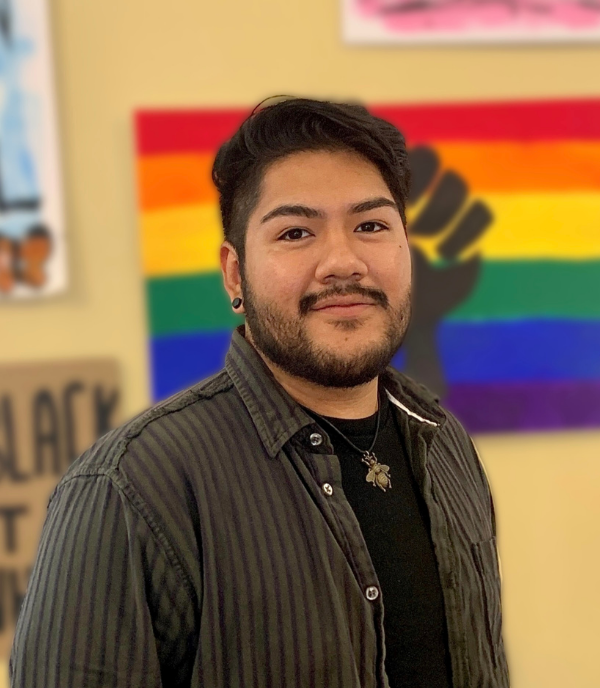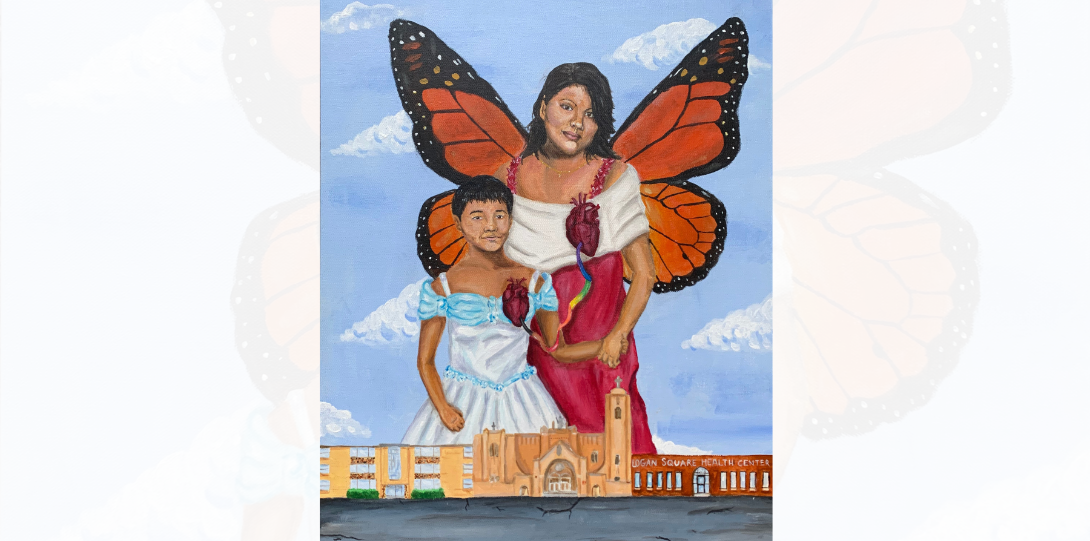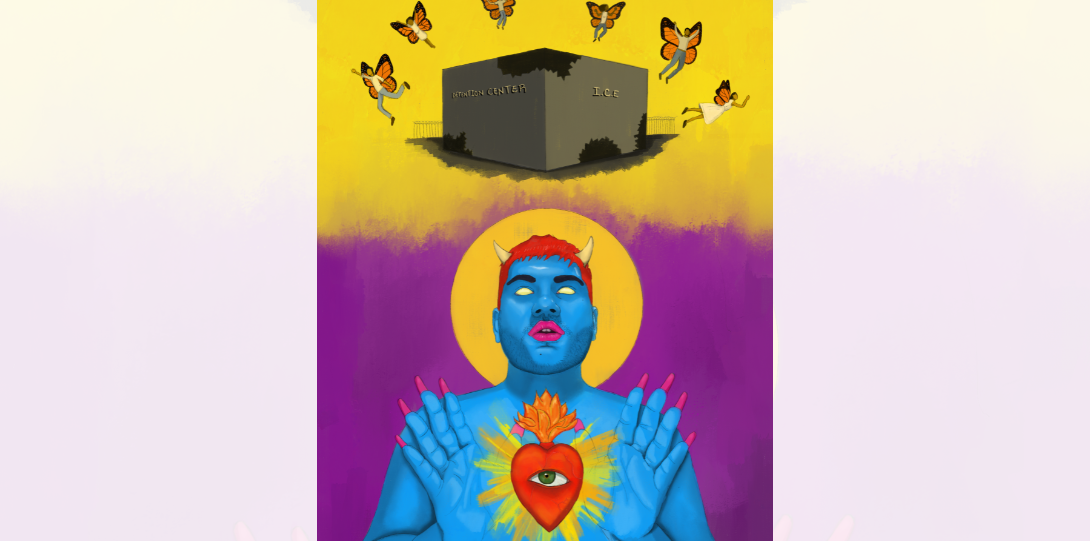2nd Year CPR Student, Carlos Benitez Cruz
We caught up with 2nd year Community and Prevention PhD Student, Carlos Benitez Cruz.
Carlos Benitez Cruz Heading link

We were so excited to sit down and interview Carlos to learn more about his experience in the program and work he’s doing in the community!
[TT] Carlos, thank you so much for your willingness to be our featured Grad Student this month! Let’s get started! Would you mind sharing a little about your background?
[CBC] My story is a little long, but I’ll kind of put it together. I was born in Mexico City, Mexico. My family immigrated here when I was 4, and we settled in Chicago, where I grew up on the Northwest side. I am a product of CPS (Chicago Public Schools), and I am undocumented.
[TT] How did you become interested in Psychology? What led you here?
[CBC] I stayed around the Chicago land area. So, by the time I got to college I went to Dominican University right outside the west side of Chicago. I majored in Psychology and Study of Women in Gender. My interest in psychology started since I was a little kid; I was really interested in people. I was like, what’s going on with people? Who are they? Why do they do the things that they do? And I knew psychology was something that I really wanted to study. It wasn’t until I got to a college when I started to engage in student activism and community organizing, my eyes opened. I started to look up, and I realized there are all these systems in place. Systems like racism, sexism, xenophobia, homophobia, ableism to name a few. Systems exist and people are not just doing things because they want to do them. It’s because they are embedded in histories of oppression and resistance. I was a part of that history as a queer person, as an undocumented person, as a brown person.
Very luckily, I had a mentor in college, Dr. Tina Taylor-Ritzler who is a Community Psychologist. She helped me web these interests together between community organizing; looking at systems; looking at people; empirically analyzing systems and programs and challenging them; and being able to create resistance. That’s a long way to tell you where I have been and how I got here into my interest in psychology.
[TT] What attracted you to UIC and to the Psychology Department?
[CBC] I think what attracted me to UIC Psychology is exactly where it is placed. Again, I’m a Chicago native. I’m very familiar with Chicago, and while I was looking for a graduate education, I wanted to be in a place where the graduate students and undergraduate students reflected who I grew up around. As I looked forward as an educator, I wanted to give back to my community and pull students from underrepresented and marginalized backgrounds into academia and help them succeed. I wanted to touch students on their way in their trajectory in post-secondary education.
While I was looking at schools, I was really looking at the student base. Asking who the students were. UIC is the largest public school in Chicago. And because of that it gets a lot of students from CPS, and I mentioned I’m a CPS alum, so I wanted to give back to my community and my community are CPS students. So now that I’m in the classroom, I get so happy to be able to interface with students who look like my peers when I was in CPS and look like my community when I go back home on the Northwest side. That was one of the major things that attracted me to UIC. And then the UIC Psychology program. Community Psychology is a niche field. I was looking at the faculty and encountered Dr. Jess Shaw, who I applied to. I saw her work and critique of systems (like the Criminal Legal System) and I knew I wanted to learn from her. I wanted to be in a space where I could grow as a critical thinker and psychologist and engage in pointed critiques of system, while also be in a space with students who are black and brown.
[TT] Could you share with the readers what your research interests are or what you are currently working on?
[CBC] I’m still struggling with what my research interests because it’s so broad. I am interested in social justice in social science. How does social science help achieve social justice? With that in mind, I’m falling into these two areas where I’m really interested in doing research as I mentioned before in criticizing systems. Asking questions like, How do systems like the criminal legal system, community organizations, and policing—how are they failing communities? Particularly like queer and BIPOC communities? How are they failing survivors? And what can we do to help make the experiences of survivors of sexual assault within these systems better? Given that these systems still exist, and they must be critiqued, and they must be changed because people interface them every day.
And then the second part of my research interests is looking at communities and seeing how do marginalized communities thrive, resist, and make meaning of life in systems that are unfair and unjust? How do they challenge dominant narratives? So those are the broad areas where I’m still kind of between and they’re tied together through this orientation towards social justice.
[TT] What are you currently working on?
[CBC] Currently, I have two projects that I’m firmly working on, and one is my master’s thesis. My Master’s is a descriptive study on the experiences of transgender survivors of sexual assault who choose to report their sexual assault to either police or hospitals. What is that like? Right now, in my survey of the literature we don’t know what the experiences of transgender survivors of assault looks like. We don’t know enough. And if we don’t know the experience, and how can we support them? How can we help policing agencies and the criminal legal system build supports to make sure transgender survivors aren’t left empty handed without justice? The other project I’m working on is a paper I’m co-authoring with Mandi Urbizo-Haukjaer, who is PI. That project is documenting the experience of Latinx survivors of sexual assault in kind of the same manner as my master’s. What are their experiences? What are they like? How are they different from the experiences of white people who choose to report their assault hospitals or police?
[TT] What has your experience been like thus far in the program?
[CBC] I’m having a good time! I’m connecting with people. I really am enjoying the relationships I’m building with my cohort mates. A lot of them are my friends now. I love sharing all these ideas that are coming through. And again, like really, firmly critiquing psychology and the systems we are embedded in. All of that really excites me. So, every week I have a new idea, I’ve read another book, or I’ve read another article, and I’m so excited to share it with my friends, my colleagues, my classmates in class, or just passing through the hallways, or going to somebody’s office and bothering them. I’m having a great time, because I’ve always been very intellectually driven. This is why I came directly from undergraduate to graduate school, because it felt very natural to me. I think it’s been a good experience so far on that end.
On the other end, and the end I’ll be critical about as an undocumented student, as the only undocumented graduate student in this program and in the department, it’s been lonely. That was something I had to really sit with my first year. It was like all these fantastic things are all great. I’m building relationships with so many of my cohort mates. And now I also feel extremely lonely. Part of that was because I came from a school where ten percent of the student population was undocumented, and where I had a lot of undocumented peers, and whenever something came out, we could share it with each other, and here I’m the first one to come against the wall whenever there’s any issues regarding my status, and that part has been lonely. But I didn’t just sit with it. I’m really happy that I was able to connect with folks outside of the University through the Coalition of Undocumented Scholars and Professionals in Psychology (CUSPP).
[TT] I understand you are very involved in civic engagement and community work; can you elaborate a bit more on some of the work you’re doing outside of the department?
[CBC] Yes! As I mentioned, I am grateful that [CUSPP] showed up. It was because Dr. Joel Martinez was presenting in Social Psychology Brown Bag. They threw it out there they were building this organization, at the time under a different name, but it was CUSPP. They were requesting any undocumented students, graduate students, or PhD holders’ names be sent to Joel. And so, surely enough three of my cohort mates were like, “Carlos! We found somebody you can connect with!” That’s how I found Joel. It’s an organization of undocumented folks in psychology around the country. What we set out to do is connect with each other, build community, share space, and critique psychology: where are its pitfalls? What is [psychology] not addressing when it comes to things like race, gender, undocumented or legalized status?
We use terms like “illegality” and “illegalized” to point up at the systems. We’re not just undocumented. It’s not something that we are. We are illegalized by the legal systems, and by the immigration systems in this country. What I’m really excited about CUSPP is how much it is expanding and touching other undocumented folks around the country. We held our first Mini-Conference this summer. It was only undocumented people, and I was able to connect with other undocumented scholars who are asking fantastic questions about access, what it means to be undocumented, what it means to be “illegal”—and really turning some assumptions on their heads. So together I’m really looking forward to building theories of illegality in psychology with CUSPP and its members because we’re a bunch of nerds, and that’s what we do. But also, just connecting with folks and continuing to hold community by having social hours together.
[TT] What advice would you give prospective students who are considering pursuing a PhD at UIC Psychology? Specifically, students of color and students who are undocumented?
[CBC] Find a mentor and take your time. A mentor, I have learned makes it or breaks it for young scholars. I was lucky as an undergrad. I had so many people in my corner. I worked hard to develop relationship with them and learn from them. As a person of color and/or an undocumented student, you need to be very proactive about finding people and finding the right people to learn from. That doesn’t mean that your mentor needs to be perfect. That means you need to create a assortment of mentors, where you learn different things from them, how to interact in different environments with them, how to challenge things, and learn what you like from your mentor and what you don’t. I’m speaking very broadly, because again, I come from an organizing background. My mentors were folks who were staff members at Dominican who did work in policy and family engagement. But also, psychologists and researchers, and storytellers and artists. So, I was able to learn all these little pieces of what I wanted to be from all of them, and I took my time learning from them. I think that really prepared me for when I decided to pursue a PhD. Where am I going with this? And how do I want to get there? What kind of scholar do I want to be? So, take your time and pick the right mentors.
[TT] What advice do you have for current the current First-Year cohort?
[CBC] Find time to slow down and breathe. Everything in graduate school comes at you fast. If you don’t find time to breathe and take care of yourself, you’re going to burn out and you don’t want to do that. And I know that sounds general, and it sounds idealistic and optimistic, but really find time to breathe.
One of the ways that I have found that I have had time to breathe is by seeking out community. Part of that for me has been with CUSPP. The other part is with my cohort right now. The folks in my cohort are my rocks. I go to them to hide from all my responsibilities and find space to process things that are happening. And I’m also really proud of my cohort mates Josh [Lovett] and Felicia [Gutierrez], who are creating groups for students to find community to interface with each other and also advocate for our needs. Josh has created a TA Support Group, and Felicia created SOURCE, which is a group for graduate students of color to be able to hold space with one another. So, seek these resources out, but also find what you need for yourself.
[TT] What are you most looking forward to this year or while continuing your degree?
[CBC] I’m most excited to share ideas, learn from others, and being able to pick people’s brains on how they see the world and construct all these theories of how to change the world too.
[TT] What are some hobbies or things you do in your leisure time?
[CBC] I’m an artist. I paint, I embroider, I do art. This is how I find refuge at home sometimes from my work. I just sit down and embroider, and that’s my meditative process.
—
Thank you again, Carlos for sitting down with me for this interview! We all wish you the very best with all your upcoming projects!

